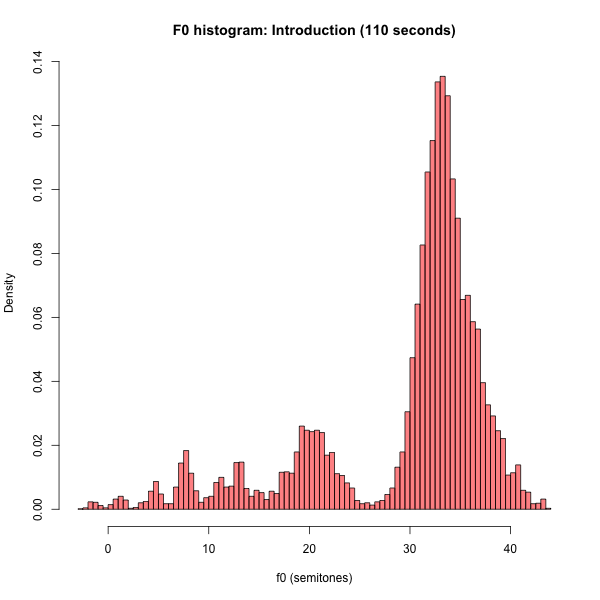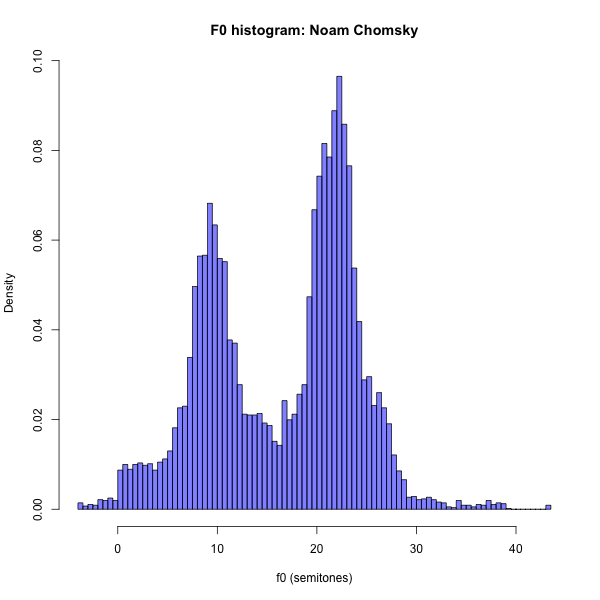And we have a winner…
« previous post | next post »
Back in February, Arika Okrent asked "What is vocal fry?", in her column at Mental Floss. And she pointed out that
People’s voices naturally drop in pitch at the end of phrases, and in many speakers, it will drop into the fry zone at that point. The evidence that it’s a female thing is also anecdotal. Plenty of men fall into vocal fry. For instance, Noam Chomsky has it pretty bad.
As an example, she embedded Ali G's interview with Prof. Chomsky a decade ago, which we linked to back in 2006 ("Ali G in the land of colorless green ideas", 4/5/2006):
So I thought I'd try out the Creakometer™ that I proposed a couple of days ago ("More Pinker Peace creak", 7/25/2015), which is based on the proportion of pitch estimates below the speaker's modal-range distribution. Thus the young woman introducing Steven Pinker's Nobel Peace Forum lecture scored 23.4%:
Since then, I've looked at a half a dozen other speakers (without reporting on it yet), and I've seen a range from around 2% on up, with that 24.3% the highest seen so far. But Noam's score in the Ali G interview is 44.1%:
As Arika observed, "No one seems to be complaining that Chomsky’s creaky voice makes him sound ditzy."
[N.B. I pointed out in that earlier post that the Creakometer still needs a bit of calibration, since different pitch-tracker choices will affect the scores. But still…]


Jerry Friedman said,
July 27, 2015 @ 8:49 pm
I suspect people wouldn't say that a woman of Chomsky's age who creaked as much sounded ditzy either.
Tara said,
July 27, 2015 @ 8:57 pm
At the risk of sounding like I missed the joke: creakiness in a speaker Chomsky's age is much more likely to be physiological in origin (http://www.ncbi.nlm.nih.gov/pubmed/17483679) than stylistic. I checked older footage of Chomsky, and he does seem to have been quite a bit less creaky in the 60s than today. But more importantly, listen to William F. Buckley in the same recording! I suspect that Noam has been out-creaked. https://www.youtube.com/watch?v=0k9aTeoDBxw
sivilyslare said,
July 27, 2015 @ 9:29 pm
Question for whoever –
Sorry for my ignorance on the subject, (I'm just a high school student interested in pursuing a career in linguistics because of my love for morphology and syntax), but why is vocal fry such an important subject?
[(myl) The subject has little intrinsic importance.
I don't mention it in the 26 lectures in the undergrad introductory course at Penn (or at least I haven't done so in the past). I discuss it briefly in introductory phonetics, in the context of teaching about normal voice quality variation, or about certain kinds of vocal pathology. People who write pitch-tracking software — which I've done in the past — need to worry about it.
What has changed is that in the past decade, at least since a story in 2006 about "City Girl Squawk", and increasing after a 2011 Journal of Voice article, there have been hundreds or thousands of media pieces noting or complaining about a "fad" or "epidemic" of "vocal fry" among young women.
It remains unclear whether this is discussion of a genuine sociolinguistic trend, or what I called "a gigantic epidemic of stereotype formation and confirmation bias", or a combination of both. And whether or not there's a genuine trend, the sometimes-hysterical reaction is worthy of note, like the campaigns against split infinitives or sentence-initial conjunctions or restrictive which.
Deborah Cameron makes the point that when this kind of reaction is focused on (allegedly) gender-associated aspects of speech and language, it's usually women's speech or writing that gets slammed. And in most cases this sort of thing is pretty clearly a reaction to the talkers or writers rather than to the patterns of talk or text.
Reactions of this kind are not just about language or just about gender. In a post a few years ago ("The social psychology of linguistic naming and shaming", 2/27/2007), I referred to the
…distaste for the way someone looks or acts that sees its object as an instance of a type. Someone's appearance or behavior gets under your skin, and it's not just that particular person, it's the whole class of people who look like that or act like that. And usually it's not just a random set of people, it's kids today, or jocks, or German tourists, or 30-something suburban women in Hummers, or those people who hang out with so-and-so. You associate the irritant with some salient combination of social features: race, ethnicity, age, sex, class, location, occupation, clique.
One prejudice of this type that remains widespread and viewed as socially acceptable is animus against "manager speak".
So the point is, "vocal fry" has become important because a bunch of irritated older people have made it important by complaining that young women are doing too much of it.]
sivilyslare said,
July 28, 2015 @ 8:29 am
Thank you so much for your response! It was quite insightful, both into modern stereotyping and a subtler kind of prejudice that I haven't been aware of until now. Once again, linguistics draws me closer, showing yet another one of its fascinating purposes.
Dan Lufkin said,
July 28, 2015 @ 8:51 am
Forgive me if I keep telling the same story again and again, but my digital hearing aid goes berserk when it hears vocal fry in the alto range. I'm far past my prime in phonetics so all I can tell you is that subjectively it renders the next few words as an unintelligible baritone growl.
So the vocal fry is more than a geezer's grouch.
georgew said,
July 28, 2015 @ 9:49 am
Either Professor Chomsky is great actor or has absolutely no sense of humor. How he could maintain a straight face and give straight answers is a wonder.
maidhc said,
July 29, 2015 @ 4:22 am
In reference to Ali G, he is cited as an early example of what is being called "Multicultural London English" (or MLE), the new dialect that is replacing Estuary English. Here are some links.